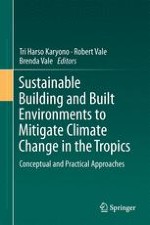2017 | OriginalPaper | Chapter
7. Smart Community Energy Systems for Low Carbon Living
Authors : A. D. Peacock, E. H. Owens, Sue Roaf, D. W. Corne
Published in: Sustainable Building and Built Environments to Mitigate Climate Change in the Tropics
Publisher: Springer International Publishing
Activate our intelligent search to find suitable subject content or patents.
Select sections of text to find matching patents with Artificial Intelligence. powered by
Select sections of text to find additional relevant content using AI-assisted search. powered by
